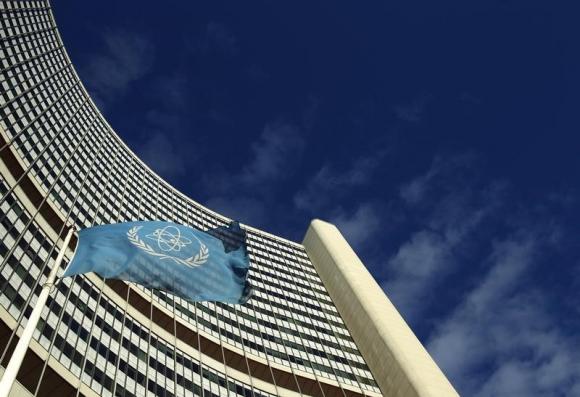 The flag of the International Atomic Energy Agency (IAEA) flies in front of its headquarters during a board of governors meeting in Vienna November 28, 2013.
The flag of the International Atomic Energy Agency (IAEA) flies in front of its headquarters during a board of governors meeting in Vienna November 28, 2013.CREDIT: REUTERS/HEINZ-PETER BADER[/caption]
(Reuters) -�Iran�said world powers should abandon their "illogical demands" over its nuclear program, ahead of talks on Thursday to try to bridge wide differences in positions and end the decade-old dispute by late November.
Deputy Foreign Minister Abbas Araqchi, one of Iran's chief negotiators, was speaking before a meeting in Vienna with senior officials from the three European members of the group of six world powers involved in the negotiations with Tehran.
The talks between�Iran�and Britain,�France�and�Germany�take place less than a week after Iran and the United States held a bilateral meeting in Geneva. It was not clear when the Vienna talks would begin.
The six powers, also grouping�Russia�and�China, will hold their first full negotiating round with Iran since July on Sept. 18 in New York, seeking to narrow differences over the future size of Iran's uranium enrichment infrastructure and other issues.
"The talks can yield results if the other party shows goodwill and abandons some of its illogical demands," Araqchi was quoted as saying in Vienna by Iran's Fars news agency.
"We hope to reach further understanding through bilateral meetings which will help advancement of the talks in New York."
Iran denies Western allegations that it is enriching uranium to develop the capability to assemble nuclear weapons, saying its atomic activities are for peaceful energy purposes.
The United States and its allies have imposed sanctions on Iran, a major oil producer, in recent years to make it scale back a nuclear program they suspect has military links.
After years of escalating tension and fears the stand-off could lead to a new Middle East war, the election last year of Hassan Rouhani, widely seen as a pragmatist, as Iranian president raised hopes of a peaceful settlement.
Last November in Geneva, Iran and the six powers reached an interim agreement under which Tehran won some sanctions easing in return for halting its most sensitive nuclear work.
But they failed to meet a July 20 target for a comprehensive agreement and set a new deadline of Nov. 24.
Diplomats say the main stumbling block is disagreement on how many centrifuges Iran should be allowed to keep to refine uranium, with Tehran rejecting demands to significantly reduce the number below the more than 19,000 it now has installed, of which roughly half are operating.
Enriched uranium can be used to fuel�nuclear power�plants, which is Iran's stated aim, but can also provide the fissile core of a nuclear bomb if processed much further.
A Vienna-based diplomat ruled out a new extension of the negotiations if there is no agreement by Nov. 24, saying it was a "hard deadline".
By Reuters
The Iran Project is not responsible for the content of quoted articles.










